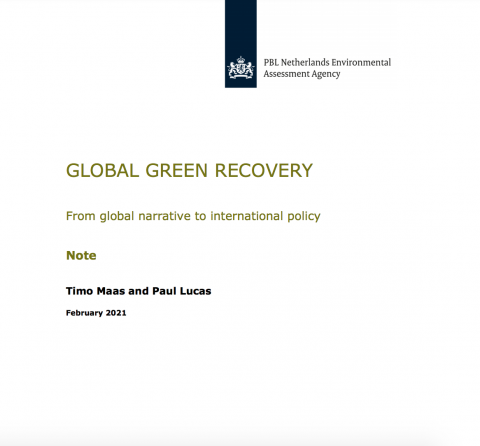Global Green Recovery From Global Narrative to International Policy

Document Summary:
Over the course of 2020, a global narrative for green recovery has emerged, combining the need to address the pressing socio-economic effects of the COVID-19 pandemic with the urgent need to trigger the long-term transitions that address global environmental challenges. Although the global green recovery narrative has been widely endorsed by governments and international organisations around the world, this has yet to be matched with concrete policy efforts. Low-income countries largely rely on reorientation of development budgets and stimulus by international financial institutions. Effectively leveraging such reorientation is helped by a better understanding of the global green recovery narrative.
It discerns three distinct logics on how the green recovery narrative is currently used or propagated: • Green recovery as a co-benefit: measures for economic recovery exist that also contribute to environmental goals. • Green recovery as a necessary condition: ignoring environmental challenges in recovery measures will lead to problems in the future. • Green recovery as an opportunity: recovery measures offer opportunities for additional progress towards environmental goals. The relative dominance of these three logics in a stimulus programme has consequences for its subsequent composition, including effectiveness, efficiency and feasibility of measures, as well as implementation.
Still, for green recovery to become more than a buzzword, using the term must have real policy consequences. Based on our analysis and country case studies on Denmark, Germany, the Netherlands, the United Kingdom and the European Union, we suggest that moving from a shared narrative to international policy, first of all, implies the need for strengthening global cooperation to achieve long-term environmental objectives. In addition, countries should acknowledge the coherence between various priority areas of green recovery and, early on, consider potential trade-offs and synergies between their primary recovery priorities and other sustainable development objectives. Furthermore, clear strategies need to be developed to address equity and inclusiveness in global recovery efforts, taking into account unevenly distributed impacts of the COVID-19 pandemic as well as distributive impacts of recovery policies. Finally, the combination of the magnitude of recovery investments and the urgency with which they need to be made, makes monitoring and accountability of investment decisions all the more pressing.
Link to an External Document:
